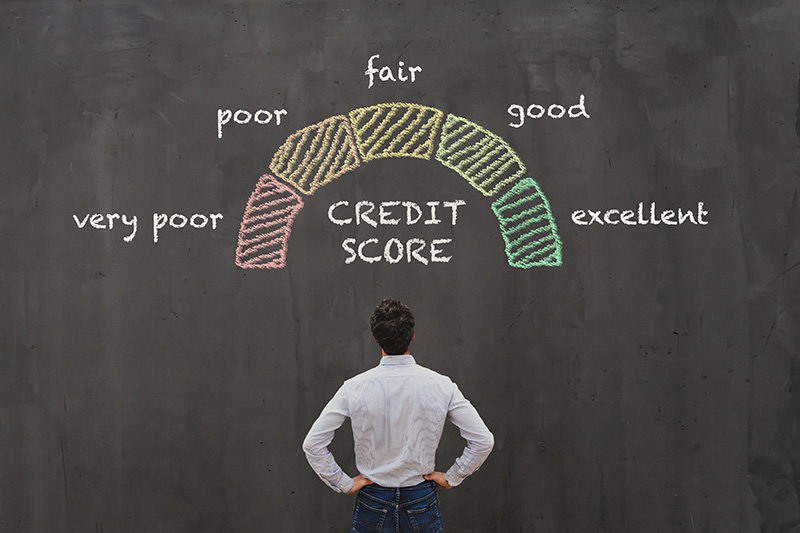What is Credit?
June 09 2022

iRide Auto Financing has been helping to answer questions for people about their credit for several years now, so we thought we’d answer some of these questions here, and show how important your credit score can be.
We'll look at a break down of the parts of your credit report, the details those parts contain, and what that tells institutions and companies who are looking at it to determine whether or not you are a "good risk," and will offer financing to you.
What is your credit report?
Your credit report is the summary of your credit history. It lists all of your most recent loan applications, any loans you currently have (or that have been closed) and the details regarding your payment history on those loans. It also points out any judgments or collections, and whether they are now paid or still outstanding.
What is a credit score?
Your credit score is expressed as a number, ranging from 300 to 900. This number is calculated using a special formula, and is used as a guideline for the condition of your credit. But this number is not the only factor lenders will use to determine whether they are going to approve your financing application. Your score can fluctuate month to month depending your activity. If you make all your payments on time, don't miss payments, and have nothing negative like a judgment or collection, then your score will stay the same, or even increase. If you have missed payments or have collections and judgments in your history, you can expect your score to decrease.
How is my credit score calculated?
A person's credit score is based on a number of factors, but put simply, it is calculated to determine risk. We can't tell you for sure how much weight is behind each of these factors, but we do know they all have an effect on a lender's decision to approve your financing application or not, based on how much risk they perceive. This risk perception helps them ensure the best chance of getting their money back, and helps to protect you from taking on too much.
Factors that can affect your score:
- How long have you had credit
- How long each loan or “trade line” has been in your report
- How much the balance owing is on your credit card(s)
- If you frequently miss payments
- The amount of your outstanding debts
- Being close to, at, or over your credit limit
- The number of times you have applied for credit recently
- The type of credit you are using (revolving payments, installment, lines of credit, credit cards, etc.)
- Debts that have been sent to a collection agency
- Any record of insolvency or bankruptcy
One thing to be aware of is that there are two credit bureaus in Canada: Equifax and TransUnion. They produce different results but, once a lender sees these scores, the lender will use their own internal scoring system to determine your financing approval.
Who creates your credit score?
Equifax and TransUnion are both private companies that collect information, store it, and then charge companies to share this information with them. They only collect information from lenders about your financial history in Canada.
Who can access your credit report?
Your credit history and the information in it is very sensitive information. But that isn't cause for worry! Not everyone has access to your history. Only those who need to be able to make determinations about risk can see your history information:
- Financial institutions like banks and credit unions
- Credit card companies
- Automotive dealers
- Retailers with in-store credit cards
- Mobile phone providers
- Insurance companies
- Government
- Employers
- Landlords
Having access to your Credit Report allows them to determine whether they will:
- Lend you money
- Offer a credit increase on an existing trade line
- Collect a debt
- Allow you to rent a property
- Hire you
- Offer a promotion
- Provide insurance
What is “checking credit” or “pulling a report”?
When someone asks for your permission to “check your credit” or “pull a report,” they are asking for your consent to access your credit report. The inquiry will be documented on your credit report. If a lender sees too many inquiries on your credit report, they may think you are either urgently seeking credit or that you are trying to live beyond your means, either of which can make the lender suspicious.
Do I need to consent to a credit check?
Most provinces require written consent to check your credit report. In Saskatchewan (along with Nova Scotia and Prince Edward Island) however, a business or individual only needs to inform you they are checking your credit report. Your consent allows the lender to view your report when you first apply, but it also allows them to access your report anytime while your account with them is still active. Your consent also allows the lender to share new information about you with Equifax and TransUnion. This will only occur if you have been approved. Also, some provincial laws allow government representatives like judges and police to access parts of your credit bureau without your consent.
What information is on my report?
Credit reports contain personal, financial, and credit histories. This information is usually updated every 30 to 90 days.
The personal information that can usually be found includes:
- Name
- Birthdate
- Current and previous addresses
- Current and previous phone numbers
- Social Insurance Number
- Driver’s License number
- Passport number
- Current and previous employers
- Current and previous job titles
- Financial information
Your credit history will usually contain:
- Non-sufficient funds payments or bad cheques
- Chequing and savings accounts closed due to money owing or fraud
- Credit you use (credit cards, retail store cards, lines of credit, loans)
- Bankruptcy or court decision against you that relate to credit
- Debts sent to collection agencies
- Inquiries from lenders and others who have requested your credit report in the past three years
- Registered items like liens that will allow the lender to seize the property if the debt is not paid
- Remarks including customer statements, fraud alerts, and identity verification alerts
- Signs of identity theft
It will also contain detailed information about your open and active credit, like:
- When your account was opened
- How much is currently owing
- How much was initially lent
- If you make your payments on time
- If you miss payments
- If your debt has been sent to a collection agency
- If you go over your credit limit
- Personal information that is available in public records, like bankruptcy
Why does my credit history matter?
Your credit score can affect your finances, which will affect your future. Financial institutions will look at your credit report to determine whether or not they are willing to lend you money for anything from a simple credit card, to a car loan or a mortgage. They also use them to determine your interest rate. Generally, the better your credit, the lower your rate, due to your lower perceived risk. Having rough spots in your credit history could make it hard for you to get even a $500 credit card, and near to impossible for a larger loan or mortgage. It can also affect your ability to rent a property or be hired for a job.
The good news, though, is that making repairs to your credit history is possible. Our knowledgeable sales and finance team at iRide Auto Financing is here to help you rebuild your credit.


